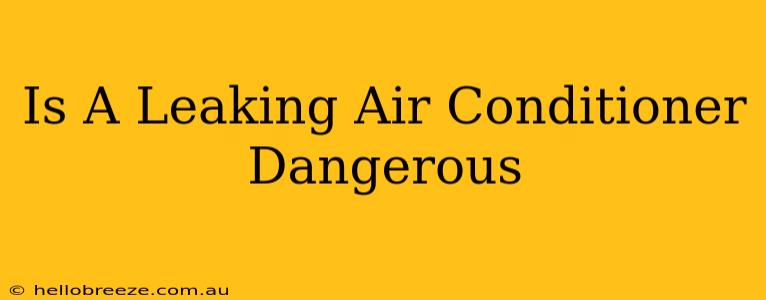A leaking air conditioner might seem like a minor inconvenience, but it can actually pose several significant dangers. Ignoring a leak can lead to costly repairs, health problems, and even property damage. This article will explore the potential hazards associated with a leaking AC unit and what you should do if you discover one.
Types of AC Leaks and Their Dangers
Air conditioners can leak different types of fluids, each carrying its own set of risks:
1. Water Leaks:
This is the most common type of AC leak. While often seemingly harmless, a water leak can indicate several problems:
- Clogged Drain Line: A frozen evaporator coil is a frequent culprit, leading to a backup and overflow of condensation water. This can cause water damage to ceilings, walls, and floors, leading to mold and mildew growth. Mold and mildew are serious health hazards, triggering allergic reactions, respiratory problems, and other illnesses.
- Refrigerant Leaks (Indirect): While not directly water, a refrigerant leak can sometimes manifest as excess water due to the system's attempt to compensate for the loss of cooling capacity. This increases wear and tear on the unit.
2. Refrigerant Leaks:
This is much more serious. Refrigerants, like R-22 or R-410A, are under high pressure inside the AC system. A leak can lead to:
- Exposure to Harmful Chemicals: Some refrigerants are toxic and can cause respiratory problems, headaches, dizziness, and even more severe health issues with prolonged exposure.
- Reduced Cooling Efficiency: A refrigerant leak significantly reduces the AC's ability to cool your home, forcing it to work harder, increasing energy consumption and potentially leading to premature failure of the compressor.
- Environmental Damage: Refrigerants can contribute to ozone depletion and global warming if released into the atmosphere.
3. Freon Leaks:
Freon is a common brand name for certain refrigerants. A Freon leak presents the same dangers as a general refrigerant leak, as described above. It's crucial to address any Freon leak immediately to protect your health and the environment.
Identifying a Leaking AC Unit
Recognizing the signs of an AC leak is crucial for timely intervention. Look for these indicators:
- Water Puddles: Obvious water around the AC unit, inside or outside your home.
- Damp Walls or Ceilings: Increased humidity or visible water stains near the air conditioner.
- Musty Odor: The smell of mold or mildew is a telltale sign of water damage.
- Poor Cooling Performance: If your AC isn't cooling effectively despite running constantly, a refrigerant leak may be the culprit.
- Hissing Sounds: A hissing sound emanating from the AC unit suggests a refrigerant leak. (Note: Normal AC operation includes some sounds, but a distinct high-pitched hiss is often indicative of a problem.)
What to Do About a Leaking Air Conditioner
If you suspect a leak, do not attempt to repair it yourself. Refrigerants are under high pressure and working with them requires specialized training and equipment. Contact a qualified HVAC technician immediately. A professional can:
- Identify the source of the leak.
- Safely repair or replace damaged components.
- Properly dispose of leaked refrigerants according to environmental regulations.
Ignoring a leaking air conditioner is risky. Prompt action can prevent costly repairs, health problems, and environmental damage. Your health and the well-being of your home are worth the investment in professional AC maintenance and repair.

